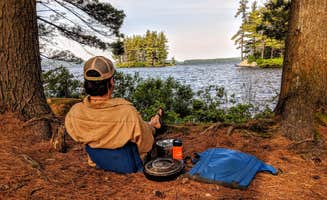Primitive camping sites near Winthrop, New York provide opportunities for solitude in the northern Adirondack region. The area features dense pine forests surrounding numerous lakes and ponds with elevations ranging between 1,500-1,700 feet. Winter camping requires extensive preparation as temperatures regularly drop below 0°F, while summer brings moderate 70-85°F days with cool nights.
What to do
Kayaking at Cranberry Lake: Launch from designated sites to explore Cranberry Lake's 7,000 acres of water. One camper noted, "Beautiful lake for kayaking and boating" with access to Cranberry Lake Backcountry Sites where paddlers can reach hiking trails.
Hiking to beaver dams: The Curtis Pond trail connects to several backcountry camping areas. A camper mentioned, "The Curtis Pond hike was our favorite and there are some incredible beaver dams along the way," though they caution to "bring your bug spray, or better yet, bug shirts" during summer months.
Swimming in Mountain Pond: The small beach area at Mountain Pond Road camping area provides swimming access with gradually sloping shorelines suitable for wading. Water remains cool even in midsummer with temperatures rarely exceeding 72°F.
What campers like
Privacy between sites: At Horseshoe Lake, the natural forest spacing creates isolation between camping spots. A reviewer mentioned, "sites are pretty shaded" which adds to the sense of seclusion but notes this means "solar and Starlink may present challenges."
Abundant wildlife viewing: Early mornings at Polliwog Lake on Floodwood Road offer opportunities to spot loons, beavers and occasionally moose. Campers appreciate the "very relaxing" atmosphere and the digital disconnect, as there's "no cell, no internet" in this remote setting.
Sunset views: Island camping provides unobstructed panoramas. One camper at Cranberry Lake described, "The sunsets from the island were truly incredible" when staying on Catamount Island, which offers some of the most dramatic evening colors in the region.
What you should know
Water sources: Most primitive sites require bringing your own drinking water or filtering from lakes. A camper at Cranberry Lake advises, "Bring your own TP though! Also, you will either need to bring your own potable water or filter from the lake, so don't forget your water filter."
Road conditions: Access roads to many sites deteriorate after rainfall. At Horseshoe Lake, a camper reported, "Road is rough but easily doable if you take it slow," which applies to many access routes in the area.
Cell coverage: Expect minimal to no connectivity at most sites. Some campgrounds have "slight AT&T at earlier sites" but planning for offline navigation and emergency communication is essential for safety.
Tips for camping with families
Beginner-friendly sites: Little Green Pond offers accessible camping with minimal hiking required. A reviewer noted there are "12 designated camping spots" with some that are "on the Pond" making water activities convenient for children.
Swimming areas for children: Sites with gradual entry points are best for families. A camper described Little Green Pond has a "small beach to swim" which provides safer water access for younger children compared to rockier shorelines at other locations.
Supply planning: The nearest substantial supplies are 30+ minutes away. One camper points out that "the Village of Cranberry Lake has some supplies, but not much except the very basics at the general store. You'll need to head to Star Lake or Tupper Lake for anything of significance."
Tips from RVers
Site limitations: Most free camping near Winthrop accommodates smaller rigs only. At Jones Pond, clearance for larger vehicles is restricted by tree cover and narrow access roads, limiting RV camping to units under 25 feet in most cases.
Leveling challenges: Bring extra leveling blocks as most primitive sites feature uneven terrain. The natural forest setting means few perfectly flat parking areas, with most requiring significant adjustment to achieve stability.
Power considerations: No hookups exist at dispersed sites. As one camper at Horseshoe Lake mentioned, "As it's a forest, the sites are pretty shaded, so solar and Starlink may present challenges" requiring alternative power solutions like generators where permitted.


